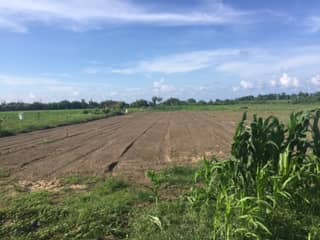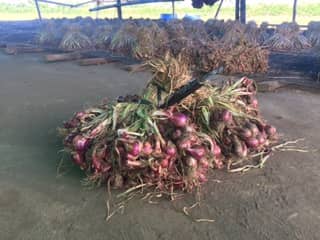On Friday, 24 February 2018, soft launching a demonstration project of shallots grown from seeds took place in Sumbawa, Nusa Tenggara Timur, Indonesia. Project partners are SSI (Sumbawang Superior Indonesia), Primaseed and the Dutch seedgrowers combination BEJO / De Groot and Slot.
Demonstration fields were set up for this purpose at local growers' groups so that the new cultivation methods can be transferred efficiently and local grower knowledge can be created with new genetics.
The company, SSI is located at Sumbawa where the volcanic soils are lighter and the micro climate is drier, so fewer fungal diseases occur. Sumbawa is one of the test areas.

Shallots are the largest vegetable product in the consumption pattern of the average Indonesian. With a 3.5 kg per year, consumption can be compared with Dutch onion consumption. In short what an onion is for a Dutchman is a shallot for an Indonesian. With an area of 120,000 ha, Indonesia is by far the largest producer of shallots in the world. Because of the large domestic consumption and the drive towards a complete reduction of imports, there has been a growing market for years.
Increasing demand
The existing crop is almost completely vegetative. This means that growers use planting material (small bulbs). The bulbs multiply during the growing season and result in a harvestable quantity of shallots. There are grown all year round and mostly in monoculture. This results in problems with the transmission of viruses and diseases via planting material. There is therefore an increasing demand for healthy starting material and new growing areas.
True Seeded Shallot
The Dutch seed companies Bejo / De Groot and Slot has since the nineties a breeding program that focuses on tropical shallots from seed (the so-called TSS = True Seeded Shallot). The introduction of this was a world first. The transmission of viruses and diseases is eliminated if you use seed and a yield increase of 50% can be realized.

The big difference between vegetative cultivation and TSS cultivation is that seeds place different demands on the growing environment than the existing cultivation method. This means that there is no substitute demand for the introduction of our new varieties but of introduction into new areas.
Indonesia is a large country with more than 17,500 islands. Together with the Wageningen University and sponsored by the Dutch Embassy in Jakarta, we have been able to conduct an investigation into suitable cultivation areas for TSS. Thanks to this research, we have now labeled some areas as potentially suitable for our breed introduction.
Together with our local partners Primasid and SSI, after years of testing, they have been able to register their varieties for the Indonesian variety list. This is a next phase of the introduction. As everywhere in the world growers will often have to be locally convinced of the added value of new genetics for local cultivation.